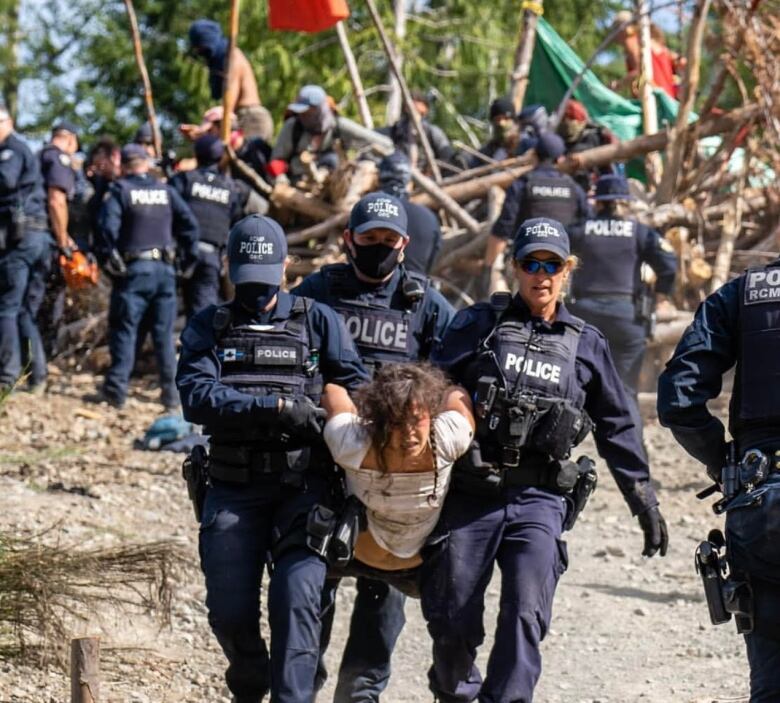Articles Menu
Sep 28, 2021
A B.C. Supreme Court judge has denied an application to extend an injunction against old-growth logging blockades on southern Vancouver Island, writing that the actions of RCMP officers have put the court's reputation at risk.
Justice Douglas Thompson handed down his reasons for judgment Tuesday, writing that "it is not just and equitable in all the circumstances of the case" to grant Teal Cedar Products Ltd.'s request for an extended injunction order against protests blocking the forestry company's access to its tenure in the Fairy Creek watershed area north of Port Renfrew.
Thompson said he acknowledged that allowing the injunction to expire could cause serious harm to the company's interests and to the rule of law.
"On the other hand, methods of enforcement of the court's order have led to serious and substantial infringement of civil liberties, including impairment of the freedom of the press to a marked degree," Thompson said.
"And, enforcement has been carried out by police officers rendered anonymous to the protesters, many of those police officers wearing 'thin blue line' badges. All of this has been done in the name of enforcing this court's order."
He wrote that the factors in favour of extending the injunction are outweighed by "the public interest in protecting the court from the risk of further depreciation of its reputation."
As of Monday evening, police have made more than 1,100 arrests in connection with their enforcement of the six-month interlocutory injunction order. As of Sept. 13, 101 criminal contempt charges have been approved by the B.C. Prosecution Service, according to Thompson's decision.
The order was first granted in April, prohibiting protesters from blocking logging routes or interfering with road construction and timber harvest. Teal Cedar had asked for a 12-month extension, but Thompson's decision means the injunction now expires at 4 p.m. PT on Tuesday.
The judge's decision weighs two competing interests — the risk of irreparable harm to Teal Cedar's business on Vancouver Island and the public interest.
Thompson said that while "a powerful case might be made for the protection of what remains of British Columbia's old growth temperate rainforests," ruling on that issue would mean stepping outside the court's constitutional role.
He explained that the more legally relevant issue to the public interest is preventing the court system from being "drawn into the fray" on the front lines between Mounties and protesters.
Thompson writes that interactions between protesters and police have largely been respectful and non-violent.
He described the protesters as "good citizens in the important sense that they care intensely about the common good," but noted occasional instances of violence in their actions.
Meanwhile, police have used reasonable force in most cases, Thompson said, but he also pointed to "disquieting lapses" shown in some videos played for the court.

"One series of images shows a police officer repeatedly pulling COVID masks off protesters' faces while pepper spray was about to be employed," the decision says.
"Another shows a police officer grabbing a guitar from a protester and flinging it to the ground, where another officer stomped on it and kicked what was left of it to the side of the road."
When those images and videos are shared widely, Thompson said he worries the actions of RCMP are being inextricably tied to the orders of his court.
Those worries also extend to orders from RCMP brass that officers should obscure their badge numbers to prevent online harassment.
"Putting aside a visceral reaction against seeing Canadian police officers in a position of anonymity from the perspective of their fellow citizens, there are good reasons for insisting on police being precisely identifiable at least by regimental number," Thompson wrote.
"Anyone, especially if congregated in a group — even police officers — might be tempted to stray from propriety if there is an increased chance that they might not be accountable for their actions."
The judge's decision acknowledges that protesters' tactics have become "more extreme over time," and often include digging deep trenches and attaching people to buried locking devices, or building towering tripods that demonstrators can perch upon.
Some of these actions have led to serious property damage, hurt Teal Cedar's bottom line and created the risk of serious injury, Thompson went on to say.
Despite those concerns, however, he wrote that even without the power of an injunction, police will still be able to patrol the protest area and arrest people committing crimes.
He also touched on a July decision in favour of a coalition of news organizations and press freedom groups objecting to the RCMP's restriction of media access to the protest sites.
In Tuesday's judgment, Thompson pointed to the RCMP's use of checkpoints and exclusion zones, and officers' insistence on escorting reporters while they were within the injunction area.
One journalist told the court that police restrictions on journalists' movement was comparable to what he saw working in China, according to the decision.
Journalist
Bethany Lindsay is a B.C. journalist with a focus on the courts, health, science and social justice issues. Questions or news tips? Get in touch at bethany.lindsay@cbc.ca or on Twitter through @bethanylindsay.